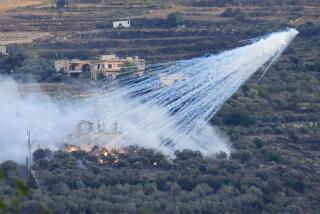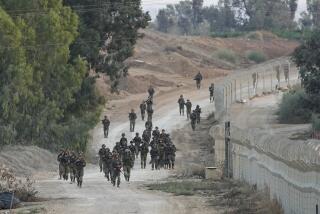No Poison Gas--a Mystery for the Allies : Military: Officers are baffled but relieved that Hussein did not use chemical weapons.
WASHINGTON — As Iraq’s once-vaunted Republican Guard went down to final defeat in the last battles of the Persian Gulf War, one of the great puzzles of the conflict was why Saddam Hussein did not use the most fearsome weapon in his arsenal--chemical weapons.
Military interrogators are expected to put this issue high on their priority list of questions to ask Iraqi prisoners of war.
“I don’t know the answer but thank God they didn’t,” Gen. H. Norman Schwarzkopf, U.S. commander of Operation Desert Storm, said Wednesday, reflecting both the bafflement and the relief felt by allied military officials over an issue that loomed as a potential nightmare from the beginning.
Although TNT is more effective, pound for pound, than chemicals in killing people, Hussein had repeatedly threatened to gas U.S.-led coalition armies as well as Israel. Chemical weapons were found in at least two Iraqi bunkers overrun in Kuwait, according to reports, and Iraqi field commanders were said to have had authority to use it since mid-January.
Still, if a definitive answer is not yet available, U.S. military experts and other analysts said that several factors appear to have deterred and prevented Iraq from using the terror weapon.
Schwarzkopf suggested that the key reason was the early and extensive destruction of Iraqi artillery, one of the two main delivery methods for the chemicals. “We went after the artillery big time,” he said.
Iraqi aircraft, the other potential delivery method, had either fled, been forced into hiding or been destroyed, he indicated.
Another major factor was the speed with which coalition troops broke through Iraq’s maze of minefields, razor wire and trenches along the Kuwaiti border, according to Pentagon officials. The allies overran Iraqi artillery positions or put the artillerymen to flight before the weapons could be used effectively.
The rapid advance was a deliberate U.S. tactic planned beforehand to lessen the vulnerability to chemical attack--the “dirtiest trick,” as one U.S. Army officer called it. The other tactic was to avoid massing, or concentrating, forces within Iraqi artillery range to minimize the effects of a gas attack if it came.
“We went through so fast, things were so confused, they (the Iraqis) didn’t know where to shoot,” a Pentagon official said. “At times, they hit their own men with H.E. (high explosive) rounds. And remember, with chemicals you can’t just fire one round. It has to be a barrage of many rounds to create a lethal cloud.”
Very little chemical poison is needed to kill: only one milligram of the volatile nerve gas sarin when inhaled, or five drops (200 milligrams) of the non-volatile nerve agent VX on the skin. But very large amounts must be delivered with accuracy and proper timing to be militarily significant.
One ton of nerve gas--or about the contents of 300 artillery rounds--are needed to produce heavy casualties among unprotected populations in an area one-third of a square mile, according to Harvard specialist Matthew Meselson. Winds must be light and the air moderately stable.
In Kuwait this week, weather conditions were not good for using either poison gases or nerve agents. Heavy rain fell and winds were turbulent and not blowing in their usual patterns for this season. In such conditions, chemicals could have been either quickly dissipated, neutralized or hurt Iraqi troops more than coalition forces.
Indeed, Vice Adm. Stanley Arthur, commander of U.S. naval forces in the Persian Gulf, said he believes that Hussein would have used chemical weapons against advancing allied forces if the wind had not changed shortly before the attack was launched early Monday morning.
“Right after the land campaign kicked off, the wind started going a little squirrelly,” Arthur said. “Here, in the middle of all this, we started picking up some southerly winds . . . I’m fairly sure the poor folks who were sitting in the field, looking at the prospect of the stuff flowing right back on them” simply decided against using it.
Still another factor could have been the leaflets and loudspeaker broadcasts warning Iraqi commanders that they would be held responsible if chemical weapons were used. “If you know you’re going to be overrun soon,” explained an Army officer, “you might not want to throw gas at the other guys. They may not treat you kindly when they arrive.”
Nevertheless, said Elisa Harris, a chemical warfare specialist at the Brookings Institution, “I’m surprised the Iraqis didn’t fire some chemicals to at least slow our troops down. Not necessarily lethal amounts, but enough to keep our guys in that heavy protective gear, maybe forced them to begin decontamination procedures and avoid contaminated areas, and become much more vulnerable to high explosive rounds.”
The fact that Hussein did not use chemical warheads on the Scud missiles fired against Israel also was puzzling despite various explanations.
The Jewish state escaped, U.S. intelligence sources said, because Iraq failed to develop a fuse for a Scud chemical warhead so that it could blow up most effectively--in the air to create a cloud or near the ground to spread poisonous liquid. All of the roughly 80 Scuds fired so far by Iraq have used only high explosive warheads.
Another possible reason is that Hussein feared he might accidentally gas Palestinians, his biggest supporters, with the inaccurate ballistic missiles, according to Amy Smithson, a chemical warfare expert at the Henry L. Stimson Center here. Four of the 39 Scuds fired at Israel landed in the occupied West Bank.
Nonetheless, if Hussein’s goal had been to bring Israel into the war and thereby split off the Arab coalition members, it remains surprising that he did not load at least one Scud with chemicals and fire it at Israel, experts agree. The presence of poisonous chemicals in a warhead, however ineffective, could well have driven Israel to retaliate.
In terms of battlefield use, Schwarzkopf said two other factors may have deterred Iraq: fear of U.S. nuclear retaliation and degradation of Iraqi chemical munitions in storage. He suggested that because of “the damage we did to their chemical production facilities, they were unable to upgrade the chemicals within their weapons.”
Non-government experts like Harris were skeptical, however. “I can’t believe Saddam Hussein really feared an American nuclear strike,” she said.
More to Read
Sign up for Essential California
The most important California stories and recommendations in your inbox every morning.
You may occasionally receive promotional content from the Los Angeles Times.










